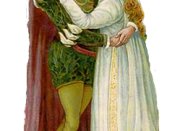Romeo and Macbeth are known as tragic heroes, and one part of the tragic hero criteria is their downfall arouses pity or fear in the audience so Shakespeare manipulates the structure of both plays to include a soliloquy. These soliloquies are designed to show that both Romeo and Macbeth's downfall produce pity in the audience. In Romeo's soliloquy during Act 2 Scene 2 it shows that, although his fatal flaw is present, the audience still has the feeling of pity for Romeo. In his soliloquy Romeo says 'it is my love, O, it is my love!' This quote shows that it produces pity in the audience as Romeo does actually love Juliet. Romeo doesn't love Juliet just for financial status or to be integrated into a family and to join two families together, as most marriages in Shakespeare times were for these reasons, he loves Juliet on none of these rather than true love itself.
The audience feel pity as love is an emotion that everyone possesses and Romeo was the unfortunate one to meet the worst end of loving someone too much. The word 'O' shows us that Romeo is almost in pain because he loves Juliet too much and his love for her ultimately, being normal loving someone else, leads to his downfall which the audience feel pity for. Shakespeare may have written this, this way to tell us that love is an emotional barrier which prevents us from seeing the reality around us. This is to make the audience the reality of the world around them and to see how one simple emotion could have such a devastating effect on someone, in this case being Romeo. Similarly in Macbeth's soliloquy, Shakespeare makes the audience feel pity for Macbeth during Act 1 Scene 7 where Shakespeare writes 'Bloody instructions, which, being taught, return to plague the inventor' and the words 'bloody' and 'instructions' suggest that Macbeth has been following 'instructions' his whole life and has been told to kill endlessly, and to do all sorts of 'bloody' things and most of all these 'instructions' came from a female character making Macbeth seem weak and weak minded as a female has dominated his 'power' and thus producing the audience members to have pity for Macbeth. Shakespeare possibly wrote this to show the audience that men may not be as superior to women as the audience thought and he may have written this to show equality, that no man is better than any women, as in those days, people were very sexist and thought men were a superior gender compared to women. As you can see, Shakespeare uses the soliloquy idea with Romeo and with Macbeth to create pity in the audience.


